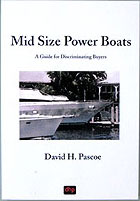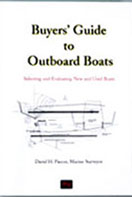Chapter 13
Excerpt
Fuel systems in pleasurecraft are regulated by CFR Title 33, Part 183, Subpart J and apply to all boats with gasoline engines.
Small passenger vessels come under 46 CFR, Subchapter T. Voluntary standards are published by the American Boat and Yacht Council, H-24 and H-33, as well as NFPA Standard 302 and Underwriters Laboratories Inc., Standard UL1102.
Surveyors typically regard these later standards as mandatory minimums.
The survey of fuel systems, particularly fuel tanks, is problematic from the standpoint of a significant lack of conformity between the CFR regulation and the voluntary standards which, although they have a similar intent, have considerable differences in actual requirements.
The surveyor, in the course of providing his usual services, is not certifying as to compliance with either the regulation or standard.
He is prevented from doing so for a variety of reasons, the foremost among these being the inaccessibility of all parts of the system, combined with the limited range of the fee for service requested by the client.
Simply stated, the scope of the survey does not permit the surveyor to dismantle portions of the vessel to gain accessibility. Nor does he have the ability to determine materials composition from visual inspection in order to verify compliance with various materials standards such as the typing and grading materials.
Scope of Survey
The surveyor who is performing a pre-purchase or insurance survey is charged mainly with evaluation of those parts of the fuel system that he can see, and those materials he can identify by sight.
In a large number of surveys that he will perform, his ability to inspect the complete system, especially fuel tanks, will often be extremely limited, and often too much so for comfort. It's quite common that fuel tanks are completely inaccessible for inspection, along with significant parts of the fuel supply system.
Faulty fuel systems are responsible for creating dangerous conditions and costly repair remedies, conditions which are of the utmost concern to the conscientious surveyor.
Unfortunately, the manner in which systems are installed in vessels conspires against the surveyor being able to fully evaluate and advise his clients of the actual condition of the system, or whether it meets both regulatory and voluntary standards.
Gasoline systems, of course, represent an explosion hazard. While diesel systems only rarely are ever associated with fires, they do represent a very real pollution hazard to the owner when systems leak and fuel is pumped overboard by bilge pumps. This is a fairly common occurrence that the surveyor should be alert to.
Marine surveyors should be conversant with CFR Title 33, Part 183, Subpart J and the two voluntary standards. While he cannot "survey" the system to a standard, knowledge of the standards will assist him in identifying visual evidence of noncompliance and faulty installations.
(Additional spaces are added for easy screen reading.)
Table of Contents: Chapter 13
13. Fuel Systems 275
Scope of Survey 275
Fuel Tanks 277
Aluminum Tanks 278
Foamed Tank Installations 279
Deck Mounted Aluminum 282
Iron Tanks 284
Stainless Steel 284
Metallic Tank Mounting 285Systems and Materials 287
Fuel Lines 287
Copper Tubing 287
Fuel Hose 288
Fuel Tank Senders 290
General Routing 290
Valves 291
Electric Fuel Pumps 292
Fuel Fill Systems 293
Tank Vents 294
Large Systems 295
 Surveying Fiberglass Power Boats
Surveying Fiberglass Power Boats - 2nd Edition
by David H. Pascoe
Soft Cover
480 pages
Publisher: D. H. Pascoe & Co., Inc.
Published: 2005
Language: English
ISBN-10: 0965649601
ISBN-13: 9780965649605
In Stock
HOME >
David Pascoe - Biography
David Pascoe is a second generation marine surveyor in his family who began his surveying career at age 16 as an apprentice in 1965 as the era of wooden boats was drawing to a close.
Certified by the National Association of Marine Surveyors in 1972, he has conducted over 5,000 pre purchase surveys in addition to having conducted hundreds of boating accident investigations, including fires, sinkings, hull failures and machinery failure analysis.
Over forty years of knowledge and experience are brought to bear in following books. David Pascoe is the author of:
- "Mid Size Power Boats" (2003)
- "Buyers’ Guide to Outboard Boats" (2002)
- "Surveying Fiberglass Power Boats" (2001, 2nd Edition - 2005)
- "Marine Investigations" (2004).
In addition to readers in the United States, boaters and boat industry professionals worldwide from over 70 countries have purchased David Pascoe's books, since introduction of his first book in 2001.
In 2012, David Pascoe has retired from marine surveying business at age 65.
On November 23rd, 2018, David Pascoe has passed away at age 71.





Normally orders ship the same day, if placed before 12:00 PM Eastern time.